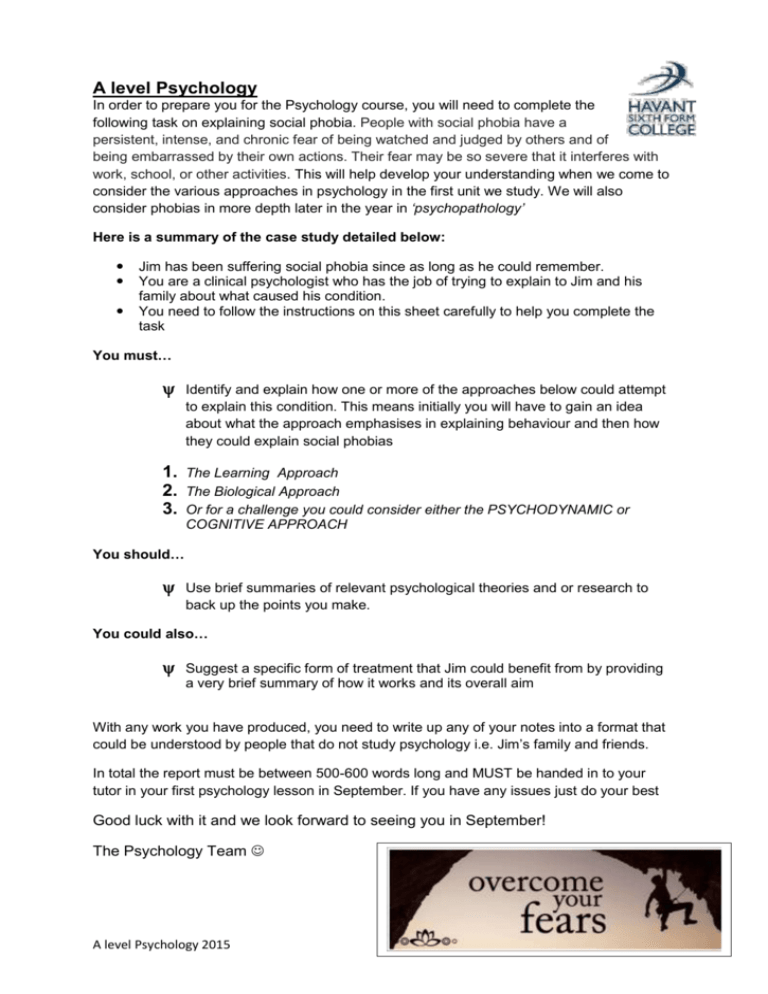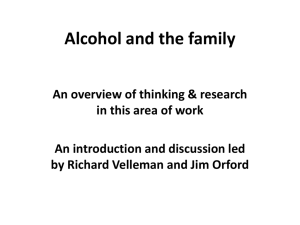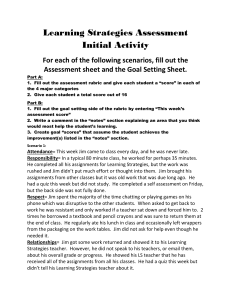Psychology - Havant Sixth Form College : Parental portal
advertisement

A level Psychology In order to prepare you for the Psychology course, you will need to complete the following task on explaining social phobia. People with social phobia have a persistent, intense, and chronic fear of being watched and judged by others and of being embarrassed by their own actions. Their fear may be so severe that it interferes with work, school, or other activities. This will help develop your understanding when we come to consider the various approaches in psychology in the first unit we study. We will also consider phobias in more depth later in the year in ‘psychopathology’ Here is a summary of the case study detailed below: Jim has been suffering social phobia since as long as he could remember. You are a clinical psychologist who has the job of trying to explain to Jim and his family about what caused his condition. You need to follow the instructions on this sheet carefully to help you complete the task You must… 1. 2. 3. Identify and explain how one or more of the approaches below could attempt to explain this condition. This means initially you will have to gain an idea about what the approach emphasises in explaining behaviour and then how they could explain social phobias The Learning Approach The Biological Approach Or for a challenge you could consider either the PSYCHODYNAMIC or COGNITIVE APPROACH You should… Use brief summaries of relevant psychological theories and or research to back up the points you make. You could also… Suggest a specific form of treatment that Jim could benefit from by providing a very brief summary of how it works and its overall aim With any work you have produced, you need to write up any of your notes into a format that could be understood by people that do not study psychology i.e. Jim’s family and friends. In total the report must be between 500-600 words long and MUST be handed in to your tutor in your first psychology lesson in September. If you have any issues just do your best Good luck with it and we look forward to seeing you in September! The Psychology Team A level Psychology 2015 Jim was a nice looking man in his mid-30’s. He could trace his shyness to boyhood and his social anxiety to his teenage years. He had married a girl he knew well from high school and had almost no other dating history. He and his wife, Lesley, had three children, two girls and a boy. At our first meeting, Jim was very shy and averted his eyes from me, but he did shake hands, respond, and smile a genuine smile. A few minutes into our session and Jim was noticeably more relaxed. "I’ve suffered with this anxiety for as long as I can remember", he said. "Even in school, I was backward and didn’t know what to say. After I got married, my wife started taking over all of the daily, family responsibilities and I was more than glad to let her." If there was an appointment to be made, Lesley made it. If there was a parent-teacher conference to go to, Lesley went to it. If Jim had something coming up, Lesley would make all the social arrangements. Even when the family ordered takeout food, it was Lesley who made the call. Jim was simply too afraid and shy. Indeed, because of his wife, Jim was able to avoid almost all social responsibility -- except at his job. It was his job and its responsibilities that brought Jim into treatment. Years earlier, Jim had worked at a small, locally-owned record and tape store, where he knew the owner and felt a part of the family. The business was slow and manageable and he never found himself on display in front of lines of people. Several years previously, however, the owner had sold his business to a national record chain, and Jim found himself a lower mid-range manager in a national corporation, a position he did not enjoy. "When I have to call people up to tell them that their order is in," he said, "I know my voice is going to be weak and break, and I will be unable to get my words out. I’ll stumble around and choke up....then I’ll blurt out the rest of my message so fast I’m afraid they won’t understand me. Sometimes I have to repeat myself and that is excruciatingly embarrassing........" Jim felt great humiliation and embarrassment about this afterwards: he couldn’t even make a telephone call to a stranger without getting extremely anxious and giving himself away. That was pretty bad! Then he would beat himself up. What was wrong with him? Why was he so timid and scared? No one else seemed to be like he was. He simply must be crazy! After a day full of this pressure, anxiety and negative thinking, Jim would leave work feeling fatigued, tired, and defeated. Meanwhile, his wife, being naturally sociable and vocal, continually enabled Jim not to have to deal with any social situations. In restaurants, his wife always ordered. At home, she answered the telephone and made all the calls out. He would tell her things that needed to be done and she would do them. He had no friends of his own, except for the couples his wife knew from her work. At times when he felt he simply had to go to these social events, Jim was very ill-at-ease, never knew what to say, and felt the silences that occurred in conversation were his fault for being so backward. He knew he made everyone else uncomfortable and ill-at-ease. Of course, the worst part of all was the anticipatory anxiety Jim felt ahead of time – when he knew he had to perform, do something in public, or even make phone calls from work. The more time he had to worry and stew about these situations, the more anxious, fearful and uncomfortable he felt. SUMMARY Jim presented a very typical case of generalized social phobia/social anxiety. His strong anticipation and belief that he wouldn’t do well at social interactions and in social events became a self-fulfilling prophecy, and his belief came true: he didn’t do well. The more nervous and anxious he got over a situation, and the more attention he paid to it, the more he could not perform well. This was a very negative paradox or "vicious cycle" that all people with social anxiety get stuck in. If your beliefs are strong that you will NOT do well, then it is likely you will not do well. Therefore, thoughts, beliefs, and emotions need to be changed Taken from : http://anxietynetwork.com/content/social-anxiety-case-study A level Psychology 2015







